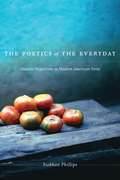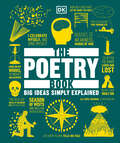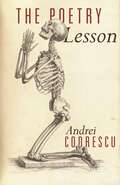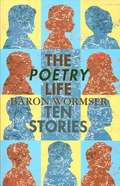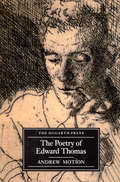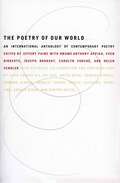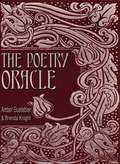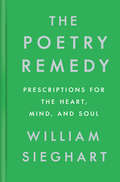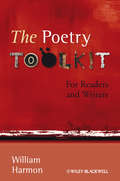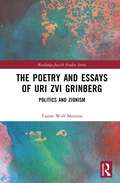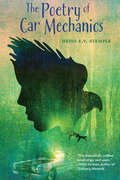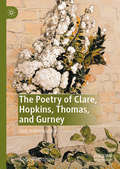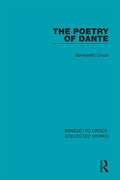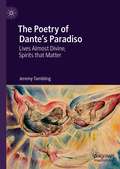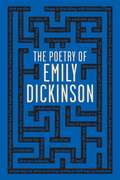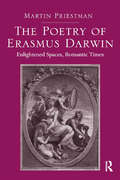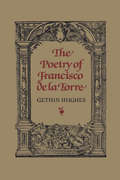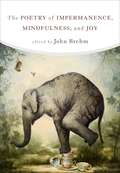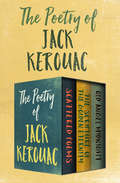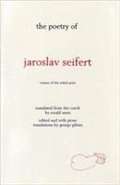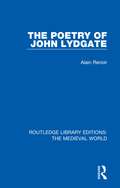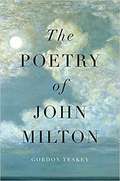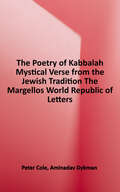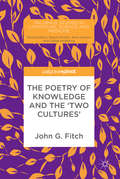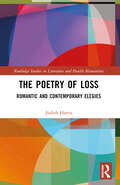- Table View
- List View
The Poetics of the Everyday: Creative Repetition in Modern American Verse
by Siobhan PhillipsWallace Stevens once described the "malady of the quotidian," lamenting the dull weight of everyday regimen. Yet he would later hail "that which is always beginning, over and over"-recognizing, if not celebrating, the possibility of fresh invention. Focusing on the poems of Wallace Stevens, Robert Frost, Elizabeth Bishop, and James Merrill, Siobhan Phillips positions everyday time as a vital category in modernist aesthetics, American literature, and poetic theory. She eloquently reveals how, through particular but related means, each of these poets converts the necessity of quotidian experience into an aesthetic and experiential opportunity. In Stevens, Phillips analyzes the implications of cyclic dualism. In Frost, she explains the theoretical depth of a habitual "middle way." In Bishop's work, she identifies the attempt to turn recurrent mornings into a "ceremony" rather than a sentence, and in Merrill, she shows how cosmic theories rely on daily habits. Phillips ultimately demonstrates that a poetics of everyday time contributes not only to a richer understanding of these four writers but also to descriptions of their era, estimations of their genre, and ongoing reconfigurations of the issues that literature reflects and illuminates.
The Poetry Book (DK Big Ideas)
by DKAn accessible guide to the most important poems ever written— from the Epic of Gilgamesh to The Waste Land—and the poets behind themDiscover the key themes and ideas behind the most important poems ever written, and the poetic geniuses who wrote them.The perfect introduction to poetry, The Poetry Book takes you on a fascinating journey through time to explore more than 90 of the world&’s greatest poetic works.Discover poems in all their many guises and from all over the world, from the epics of the ancient world through Japanese haikus and Renaissance sonnets to modernist masterpieces such as The Waste Land, and the key works of the last 50 years—from And Still I Rise by Maya Angelou to Derek Walcott&’s Omeros.Using the Big Ideas series' trademark combination of clear explanation, witty infographics, and inspirational quotes, The Poetry Book unlocks the key ideas, themes, imagery, and structural techniques behind even the most complex of poems, in clear and simple terms, setting each work in its historical, social, cultural, and literary context. Delve into the works of Dante, Baudelaire, Rimbaud, Dickinson, Eliot, and Neruda with in-depth literary analysis and fascinating biographies. Find out what odes, ballads, and allegories are. Trace recurring motifs, explore imagery, and find out how rhyme and rhythm work. From Beowulf to Seamus Heaney's Bogland, The Poetry Book is essential reading for readers of poetry and aspiring poets alike.
The Poetry Lesson
by Andrei CodrescuA rollicking story of the strangest creative writing class ever—as only Andrei Codrescu could tell it"Intro to Poetry Writing is always like this: a long labor, a breech birth, or, obversely, mining in the dark. You take healthy young Americans used to sunshine (aided sometimes by Xanax and Adderall), you blindfold them and lead them by the hand into a labyrinth made from bones. Then you tell them their assignment: 'Find the Grail. You have a New York minute to get it.' "—The Poetry LessonThe Poetry Lesson is a hilarious account of the first day of a creative writing course taught by a "typical fin-de-siècle salaried beatnik"—one with an antic imagination, an outsized personality and libido, and an endless store of entertaining literary anecdotes, reliable or otherwise. Neither a novel nor a memoir but mimicking aspects of each, The Poetry Lesson is pure Andrei Codrescu: irreverent, unconventional, brilliant, and always funny. Codrescu takes readers into the strange classroom and even stranger mind of a poet and English professor on the eve of retirement as he begins to teach his final semester of Intro to Poetry Writing. As he introduces his students to THE TOOLS OF POETRY (a list that includes a goatskin dream notebook, hypnosis, and cable TV) and THE TEN MUSES OF POETRY (mishearing, misunderstanding, mistranslating . . . ), and assigns each of them a tutelary "Ghost-Companion" poet, the teacher recalls wild tales from his coming of age as a poet in the 1960s and 1970s, even as he speculates about the lives and poetic and sexual potential of his twenty-first-century students. From arguing that Allen Ginsberg wasn't actually gay to telling about the time William Burroughs's funeral procession stopped at McDonald's, The Poetry Lesson is a thoroughly entertaining portrait of an inimitable poet, teacher, and storyteller.
The Poetry Of Edward Thomas
by Andrew MotionWhen Edward Thomas died at Arras in 1917 few people thought of him as a poet. Yet in the two years before his death, after a lifetime writing prose, Thomas wrote some of the most enduring poems of his day: poems of war, nature, friendship, despair and exultation. Andrew Motion's pioneering study of Thomas' life and achievement is scholarly yet utterly absorbing, combining an account of his struggles as a writer with perceptive readings of individual poems.Andrew Motion's books include a biography, The Lamberts, George, Constant and Kil, and several prize-winning collections of poetry, the most recent of which is Love in a Life. He is currently writing the authorized biography of Philip Larkin.
The Poetry Of Our World: An International Anthology Of Contemporary Poetry
by Ed J. PaineHere is a capacious and sparkling gathering of poems, an anthology that extends its reach from the English-speaking world to Asia, Africa, Europe, and Latin America. This unique volume includes such well-known figures as Pablo Neruda, Anna Akhmatova, Paul Celan, Seamus Heaney, Wole Soyinka, and Elizabeth Bishop but also offers the less familiar but equally welcome voices of Ugandan Okot p'Bitek, Indian A.K. Ramanujan, and the Japanese poet Shuntaro Tanikawa. With insightful essays by such eminent scholars and poets as Helen Vendler, Kwame Anthony Appiah, Sven Birkerts, Carolyn Forché, and Bei Dao placing the selections from each region in their cultural, political, and literary contexts, The Poetry of Our World guides readers through the richest and most eclectic selection of world poetry available today.
The Poetry Oracle
by Brenda Knight Amber GuetebierCombining poetry with divination, this collection resurrects the ancient Greek art of Rhapsodomancy, or divining one's fortune or destiny through the use of poetry or verse. Harkening back to antiquity, when Polyhymnia--the muse of sacred poetry--and Calliope--the muse of epic poetry--were invoked for guidance, each page of this anthology contains three poetic excerpts, chosen for their oracular wisdom. Readers are asked to contemplate a question and then randomly select an excerpt, which will offer revelations and inspiration for further contemplation. Excerpts are drawn from poets throughout the ages, including Sappho, Li Po, Rumi, Emily Dickinson, Walt Whitman, Dylan Thomas, William Blake, and J.R.R. Tolkien. Though designed as a prophetic tool, it can also be used as an introduction to some of the world's greatest poets.
The Poetry Remedy: Prescriptions for the Heart, Mind, and Soul
by William SieghartA beautiful collection of curated poems, individually selected to provide the perfect balm for every emotional need Sometimes only a poem will do. These poetic prescriptions and wise words of advice are tailored to those moments in life when we need them most, from general glumness to news overload, and from infatuation to losing the spark. Whatever you’re facing, there is a poem in these pages that will do the trick. This pocket-size companion presents the most essential fixes in William Sieghart’s poetic dispensary—those that, again and again, have shown themselves to hit the spot. Whether you are suffering from loneliness, lack of courage, heartbreak, hopelessness, or even an excess of ego—or whether you are seeking hope, comfort, inspiration, or excitement—The Poetry Remedy will provide just the poem you need in that moment.
The Poetry Toolkit: For Readers and Writers
by William HarmonThe Poetry Toolkit: For Readers and Writers provides students with the essential intellectual and practical tools necessary to read, understand, and write poetry. Explains the most important elements of poetry in clear language and an easily accessible manner Offers readers both the expertise of an established scholar and the insights of a practicing poet Draws on examples from more than 1,500 years of English literature
The Poetry and Essays of Uri Zvi Grinberg: Politics and Zionism (ISSN)
by Tamar Wolf-MonzonThis book focuses on the complex network of relationships between the poet Uri Zvi Grinberg and the Labor Movement in Mandate Palestine from 1923 to 1937.Making use of letters found in the Uri Zvi Grinberg Archive at the National Library of Israel (NLI), the author reconstructs the characteristics of Grinberg’s pioneer readership, attesting to their special relationship with his poetry. In the 1920s, it is argued, they considered Grinberg’s poetry an authentic expression of their complex spiritual world and especially of the reality of their lives. On his side, Grinberg accepted the pioneering ethos as the ideological basis of his works, becoming an outstanding poet of the Labor Movement. The chapters of this book track the various phases of Grinberg’s life and poetry, from his emigration to Palestine through to the 1930s, when he joined the Revisionist Movement and became increasingly ostracized from the Labor Movement. The story of Grinberg’s relations with the pioneers was emotionally charged—a mixture of enchantment and rejection, spiritual closeness and repulsion. Ultimately, this book analyzes the intensity of this connection and its many contradictory layers.This book will interest researchers in a range of fields, including Hebrew poetry and reception theory, as well as anyone interested in Israeli studies and the history of the Labor Movement in Palestine.
The Poetry of Car Mechanics
by Heidi E. Stemple&“This beautifully crafted novel sings and soars.&”—Nikki Grimes, author of Ordinary HazardsDylan seeks solace through birdwatching and poetry in the woods behind his grandfather&’s auto shop—but when he rescues an injured hawk, he must learn to confront the broken parts in himself in this powerful middle-grade novel-in-verse.15-year-old Dylan has always felt like an outsider in his small town. Isolated when he was younger as the result of his unpredictable, now absent mother and feeling like a disappointment to his grandfather who has stepped in to raise him, Dylan finds relief in the woods behind his grandfather's auto shop. Amidst the cool quiet of the trees, Dylan thrives on bird watching and writing poetry. But one afternoon after spotting an injured hawk, Dylan finds himself pushing out of his comfort zone to track down help for the bird—and ends up rescuing a part of himself in the process.In this luminous middle-grade novel-in-verse on navigating the lonely tumult of self-discovery amid complicated family history, Dylan relays his story with bracing emotional clarity.
The Poetry of Clare, Hopkins, Thomas, and Gurney: Lyric Individualism
by Andrew HodgsonThis book attends to four poets – John Clare, Gerard Manley Hopkins, Edward Thomas, and Ivor Gurney – whose poems are remarkable for their personal directness and distinctiveness. It shows how their writing conveys a potently individual quality of feeling, perception, and experience: each poet responds with unusual commitment to the Romantic idea of art as personal expression. The book looks closely at the vitality and intricacy of the poets’ language, the personal candour of their subject matter, and their sense, obdurate but persuasive, of their own strangeness. As it traces the tact and imagination with which each of the four writers realises the possibilities of individualism in lyric, it affirms the vibrancy of their contributions to nineteenth and twentieth-century poetry.
The Poetry of Dante (Collected Works #4)
by Benedetto CroceOriginally published in 1922 and partly from periodicals this book provides a methodological introduction to the reading of Dante’s The Divine Comedy, with the aim of removing the confusion surrounding much Dantean literature and helping the reader to focus attention on the essential qualities of Dante’s work.
The Poetry of Dante's Paradiso: Lives Almost Divine, Spirits that Matter
by Jeremy TamblingThis book argues that Paradiso – Dante’s vision of Heaven – is not simply affirmative. It posits that Paradiso compensates for disappointment rather than fulfils hopes, and where it moves into joy and vision, this also rationalises the experience of exile and the failure of all Dante’s political hopes. The book highlights and addresses a fundamental problem in reading Dante: the assumption that he writes as a Catholic Christian, which can be off-putting and induces an overly theological and partisan reading in some commentary. Accordingly, the study argues that Dante must be read now in a post-Christian modernity. It discusses Dante's Christianity fully, and takes its details as a source of wonder and beauty which need communicating to a modern reader. Yet, the study also argues that we must read for the alterity of Dante’s world from ours.
The Poetry of Emily Dickinson (Wordsworth Classics)
by Emily DickinsonThe Poetry of Emily Dickinson is a collection of pieces by 19th-century American poet Emily Dickinson, who insisted that her life of isolation gave her an introspective and deep connection with the world. As a result, her work parallels her life--misunderstood in its time, but full of depth and imagination, and covering such universal themes as nature, art, friendship, love, society, mortality, and more. During Dickinson’s lifetime, only seven of her poems were published, but after her death, her prolific writings were discovered and shared. With this volume, readers can dive into the now widely respected poetry of Emily Dickinson. Lexile code: NP
The Poetry of Erasmus Darwin: Enlightened Spaces, Romantic Times
by Martin PriestmanWhile historians of science have focused significant attention on Erasmus Darwin’s scientific ideas and milieu, relatively little attention has been paid to Darwin as a literary writer. In The Poetry of Erasmus Darwin: Enlightened Spaces, Romantic Times, Martin Priestman situates Darwin’s three major poems - The Loves of the Plants (1789), The Economy of Vegetation (1791) and The Temple of Nature (1803) - and Darwin himself within a large, polymathic late-Enlightenment network of other scientists, writers, thinkers and social movers and shakers. Interpreting Darwin’s poetry in terms of Darwin’s broader sense of the poetic text as a material space, he posits a significant shift from the Enlightenment’s emphases on conceptual spaces to the Romantic period’s emphases on historical time. He shows how Darwin’s poetry illuminates his stance toward all the major physical sciences and his well-formulated theories of evolution and materially based psychology. Priestman’s study also offers the first substantial accounts of Darwin’s mythological theories and their links to Enlightenment Rosicrucianism and Freemansonry, and of the reading of history that emerges from the fragment-poem The Progress of Society, a first-ever printed edition of which is included in an appendix. Ultimately, Priestman’s book offers readers a sustained account of Darwin’s polymathic Enlightenment worldview and cognate poetics in a period when texts are too often judged by their adherence to a retrospectively constructed ’Romanticism’.
The Poetry of Francisco de la Torre
by John HughesFrancisco de la Torre has long been praised as an outstanding poet in the mould of Garcilaso de la Vega and his simplicity of style and soft, gentle, Arcadian environment of his poetry have been emphasized. In this volume Professor Hughes attempts to define more accurately the position of Francisco de la Torre's verse in the evolution of Spanish poetry in the sixteenth century, revealing that Torre's vision of the pastoral world and his poetic language show him to be a transitional poet of considerable quality and substance and not merely an imitator of Garcilaso. Hughes demonstrates that while some of Torre's poetry follows a general pastoral pattern, his descriptions are characterized by a sense of movement through a shifting perspective and that even in poems with a traditional pastoral setting, the descriptions sometimes negate the pastoral qualities. The author also shows that Torre, rather than looking back towards Garcilaso and his contemporaries, is already anticipating – especially in his stylistic technique and in his view of nature – the attitude of the seventeenth century.
The Poetry of Impermanence, Mindfulness, and Joy
by John BrehmOver 125 poetic companions, from Basho to Billy Collins, Saigyo to Shakespeare.The poems expertly gathered here offer all that one might hope for in spiritual companionship: wisdom, compassion, peacefulness, good humor, and the ability to both absorb and express the deepest human emotions of grief and joy. The book includes a short essay on “Mindful Reading” and a meditation on sound from editor John Brehm—helping readers approach the poems from an experiential, non-analytical perspective and enter into the mindful reading of poetry as a kind of meditation. The Poetry of Impermanence, Mindfulness, and Joy offers a wide-ranging collection of 129 ancient and modern poems unlike any other anthology on bookshelves today. It uniquely places Buddhist poets like Han Shan, Tu Fu, Saigyo, Ryokan, Basho, Issa, and others alongside modern Western poets one would not expect to find in such a collection—poets like Wallace Stevens, Robert Frost, Elizabeth Bishop, William Stafford, Denise Levertov, Jack Gilbert, Ellen Bass, Billy Collins, and more. What these poems have in common, no matter whether they are explicitly Buddhist, is that all reflect the essential truths the Buddha articulated 2,500 years ago. The book provides an important poetic complement to the many prose books on mindfulness practice—the poems here both reflect and embody the dharma in ways that can’t be matched by other modes of writing. It’s unique features include an introduction that discusses the themes of impermanence, mindfulness, and joy and explores the relationship between them. Biographical notes place the poets in historical context and offer quotes and anecdotes to help readers learn about the poets’ lives.
The Poetry of Jack Kerouac: Scattered Poems, The Scripture of the Golden Eternity, and Old Angel Midnight
by Jack KerouacFrom the iconic New York Times–bestselling author of On the Road: Three revolutionary collections of poetry in one volume. Rebelling against the dry rules and literary pretentiousness he perceived in early twentieth-century poetry, Jack Kerouac pioneered a poetic style informed by oral tradition and driven by concrete language with neither embellishment nor abstraction. In these three groundbreaking collections, the legendary Beat writer offers a spontaneous, uncensored perspective on everything from religion to the structure of language itself. Scattered Poems: Bringing together selections from literary journals and his private notebooks, Scattered Poems exemplifies Kerouac&’s innovative approach to language. Populated by hitchhikers, Chinese grocers, Buddhist saints, and cultural figures from Rimbaud to Harpo Marx, the poems evoke the primal and the sublime, the everyday and the metaphysical. The Scripture of the Golden Eternity: During an unexplained fainting spell, Kerouac experienced a flash of enlightenment. A student of Buddhist philosophy, he recognized the experience as &“satori,&” a moment of life-changing epiphany. The knowledge he gained in that instant is expressed in this volume of sixty-six prose poems with language that is both precise and cryptic, mystical and plain. His vision proclaims, &“There are not two of us here, reader and writer, but one golden eternity.&” Old Angel Midnight: A spontaneous writing project in the form of an extended prose poem, this sonorous and spiritually playful book is one of Kerouac&’s most boldly experimental works. Collected from five notebooks dating from 1956 to 1959—a time in which Kerouac was immersed in Buddhist theory—Old Angel Midnight captures the rhythms of the universe and secrets of the subconscious with stunning linguistic dexterity.
The Poetry of Jaroslav Seifert
by Jaroslav Seifert Ewald Osers George GibianThis is the best translated and largest edition of poetry by the Czechs' only Nobel Prize–winning poet, Jaroslav Seifert (he won the prize in 1984 and died in 1986). The poetry is surprising in its simplicity, sensual, thoughtful, moving, comic in turns. Author Milan Kundera has called this collection “the tangible expression of the nation’s genius.”
The Poetry of John Lydgate (Routledge Library Editions: The Medieval World #40)
by Alain RenoirOriginally published in 1967, The Poetry of John Lydgate presents a broad discussion of John Lydgate’s secular poetry. It reassesses much of the poetry through critical examination and suggests that Lydgate was not necessarily the master that the medieval ages proclaimed him to be, nor the plain poet that he is often seen as in modern analysis. Instead, the book suggest that he was a competent poetic craftsman that presents substantial literary form in his poetry. The analysis in the book looks at Lydgate as atypical of the Middle Ages, instead exhibiting traits currently linked to the Renaissance. The book provides a unique perspective on John Lydgate as a poet and will be of interest to medievalist and literary historians alike.
The Poetry of John Milton
by Gordon TeskeyFor sublimity and philosophical grandeur Milton stands almost alone in world literature. His peers are Homer, Virgil, Dante, Wordsworth, and Goethe. Gordon Teskey shows how Milton's aesthetic joins beauty to truth and value to ethics and how he rediscovers the art of poetry as a way of thinking in the world as it is, and for the world as it can be.
The Poetry of Kabbalah: Mystical Verse From The Jewish Tradition
by Peter ColeThe first ever English-language collection of poetry from the Kabbalistic tradition, masterfully translated by MacArthur-winning poet Peter Cole This groundbreaking collection presents for the first time in English a substantial body of poetry that emerges directly from the sublime and often startling world of Jewish mysticism. Taking up Gershom Scholem’s call to plumb the “tremendous poetic potential” concealed in the Kabbalistic tradition, Peter Cole provides dazzling renderings of work composed on three continents over some fifteen hundred years. In addition to the translations and the texts in their original languages, Cole supplies a lively and insightful introduction, along with accessible commentaries to the poems. Aminadav Dykman adds an elegant afterword that places the work in the context of world literature. As a whole, the collection brings readers into the fascinating force field of Kabbalistic verse, where the building blocks of both language and existence itself are unveiled. Excerpts from The Poetry of Kabbalah have been featured in the Paris Review, Poetry, and Conjunctions. “Studded with insight, and written with great verve, this book will become a classic.”―Lawrence Fine, author of Physician of the Soul, Healer of the Cosmos
The Poetry of Knowledge and the 'Two Cultures' (Palgrave Studies in Literature, Science and Medicine)
by John G. FitchThis book argues that poetry is compatible with systematic knowledge including science, and indeed inherent in it; it also discusses particular poems that engage with such knowledge, including those of Lucretius, Vergil, and Vita Sackville-West. The book argues that there are substantial similarities between knowledge-making and poetry-making, for example in their being shaped by language, including metaphor, and in their seeking unity in the world, under the impulse of eros and pleasure. The book also discusses some of the obstacles to a ‘poetry of knowledge’, including scientific objectivism, the Kantian tradition in philosophy, and the separation of the ‘two cultures’ in our academic and intellectual institutions. The book is designed to be accessible to all those interested in the issue of the ‘two cultures’, or in the role of poetry and of science in contemporary culture.
The Poetry of Loss: Romantic and Contemporary Elegies (Routledge Studies in Literature and Health Humanities)
by Judith HarrisThe Poetry of Loss: Romantic and Contemporary Elegies presents a renewed look at elegy as a long-standing tradition in the literature of loss, exploring recent shifts in the continuum of these memorial poems. This volume investigates the tensions arising in elegiac formulations of grief through detailed analyses of seminal poets, including Wordsworth, Keats, and Plath, using psychoanalytic precepts to reconceptualize consolation through poetic strategies of inner representation and what it might mean for personal and collective experiences of loss. Tracing the development of elegy beyond extant readings, this volume addresses contemporary constructs of mourning and their attendant polemics within the wider culture as extensions of elegiac longings and the tendency to refuse consolation and cede to the endlessness of grief. Furthermore, this book concludes that contemporary elegies break with conventions of poetic structure and expression; rather than the poets seeking resolution to grief through compensation, they often find themselves dwelling within the loss rather than externalizing and transcending it. The Poetry of Loss: Romantic and Contemporary Elegies examines these developing psychoanalytic concepts pertaining to a poetics of loss, providing readers with a new appreciation of mourning culture and contemporary attitudes towards grief.
